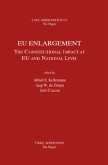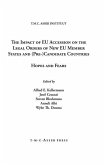parliament in the conduct of European affairs and the operation of the Hungarian Permanent Representation to the EU are meticulously mapped out. The same holds true for the last stage of the co-actorship cycle, the phase of implementation. Previous academic (comparative) research in relation to the accession of the C- tral and Eastern European Countries was primarily focused on the constitutional adaptations. While the present study certainly starts with presenting the Hungarian constitutional context, it is going far beyond that by examining and evaluating the national legislative and administrative structures and mechanisms. In particular in relation to that last aspect, the study can be characterised as pioneering work. For Hungary - but probably also for many other countries - in a number of respects, the author has conducted unique research, based on empirical data and on not pre- ously collected and analysed government and parliament documents. This book is warmly recommended to anybody interested in the, until now, little explored and partly also practical implications of EU-membership of, in particular, the post-communist countries.
Hinweis: Dieser Artikel kann nur an eine deutsche Lieferadresse ausgeliefert werden.
Hinweis: Dieser Artikel kann nur an eine deutsche Lieferadresse ausgeliefert werden.








